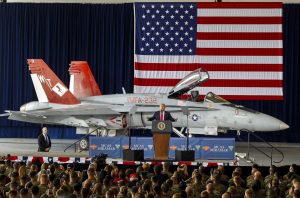Space Force could be beneficial
August 23, 2018
On June 18, President Donald Trump signed a directive to the U.S. Defense Department to begin the establishment of the U.S. Space Force, what he called the “sixth branch of the Armed Forces.”
When Trump announced the creation of the Space Force, I will admit, I was a bit shocked. For me, I felt as though it was the first major military action in space by the U.S. government since the 1980s, with President Ronald Reagan’s “Star Wars” initiative. In a fact sheet issued by the White House on Aug. 9, we got a little better look at what exactly this new branch of the military would do, how it would be set up, and why it was necessary.
According to the fact sheet, national-security and space experts will begin building the new branch, focused on searching for and developing new technologies that intertwine these two fields. The branch would also immediately establish a “Space Command,” focused on understanding and planning “space war-fighting.”
That seemed simple enough to me. My last question was, “Why?” That was answered by Vice President Mike Pence in a speech on Aug. 9 at the Pentagon. He spoke about Russia’s and China’s developments in space destruction, especially on satellites and U.S. space equipment to demonstrate that space has moved from being peaceful to being far less than pleasant.
This was expanded upon in the fact sheet, which says, “The director of National Intelligence has warned that multiple countries, including Russia and China, are developing both destructive and nondestructive anti-satellite weapons that could come online within a few years.”
So while some may think it is a bit odd, or perhaps unnecessary, we should all probably take a second look at the Space Force. While space used to be considered the “Final Frontier,” it is becoming more easily accessible, not just by the United States but by major nations across the world, and we must show that we are prepared for rapid expansion and potential threats in space.













